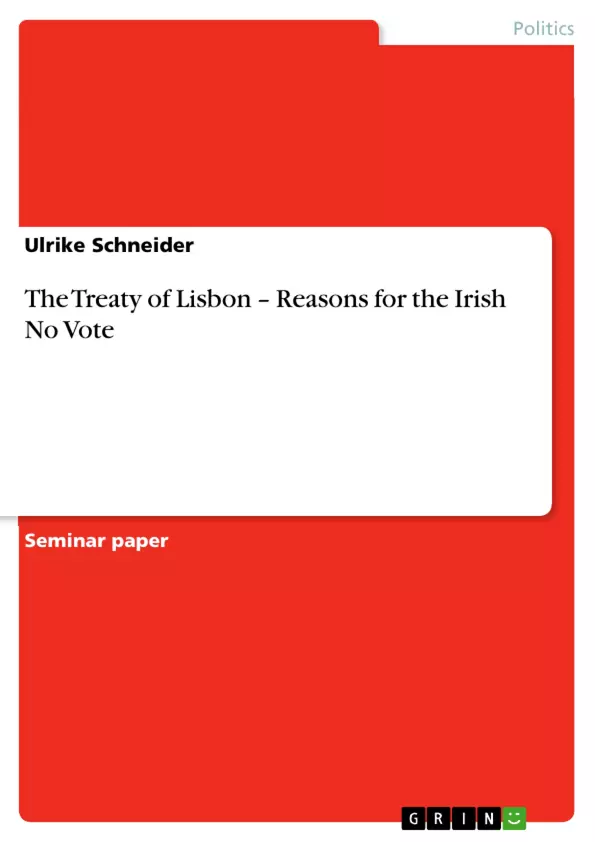On June 12, 2.8 million Irish voters got the chance to move the European Union one step further by voting in favour of the Treaty of Lisbon. Ireland was the only European country that allowed its citizens to express their opinion on the Treaty by means of a referendum. Suspense was created by the fact that a non-ratification of only one country was enough to stop the whole treaty. Just a little more than half of the Irish people went to the polls so that eventually 860,000 no votes were enough to obtain a majority. Less than a million people were able stop a treaty which was supposed to make the EU and its institutions, regulations and law finally suitable for 27 member states and 492 million Europeans in a constantly changing world, facing new problems like terrorism and climate change. All member states of the EU had agreed on the Treaty of Lisbon and ratified it as they thought the EU urgently needed a modernisation of the European Institutions. The Treaty of Nice, which forms the present basis of the European Union and goes back to the fifties, and the Treaties of Rome cannot meet this challenge anymore.
Ireland is regarded as one of the “winners” of the European Union. For years, it experienced sustained economic growth, full employment and a rising GDP . Then what could be the reason the majority of the Irish people voted against the Treaty of Lisbon or did not even go to the polls, instead of voting in favour of a treaty that would have improved the strength of the EU to which Ireland owes so much?
More and more, the European Union struggles with the increasing problem that it has to defend its acceptance to European citizens. People turn away from the Community because they have got the feeling that they are ill-informed and their interests are less represented on the European then on the national level. There are huge divergences in the ideas about the EU, the politicians and the citizens have which has lead to disenchantment with politics. This paper claims that the Irish people did not reject the Treaty of Lisbon itself but were simply not able to assess the advantages and disadvantages of the Treaty of Lisbon because of missing independent information.
Inhaltsverzeichnis (Table of Contents)
- Introduction
- The Treaty of Lisbon
- Reasons for the Irish no vote
- Actual changes for the Irish people due to the Treaty of Lisbon
- Insufficient information
- Insufficient information about the EU in general
- Insufficient information about the Treaty of Lisbon
- Misleading information
- Misleading information by “Sinn Féin” and “Libertas”
- Misleading information by further groups
- Conclusion
Zielsetzung und Themenschwerpunkte (Objectives and Key Themes)
This paper aims to analyze the reasons for the Irish rejection of the Treaty of Lisbon in 2008. It examines the legal changes proposed by the Treaty, the flow of information regarding the Treaty in Ireland, and the role of misinformation in shaping public opinion. The key themes explored in this paper are:- The significance of the Irish no vote on the Treaty of Lisbon
- The impact of the Treaty of Lisbon on the EU and its citizens
- The role of public information and misinformation in shaping political decisions
- The challenges faced by the EU in achieving public acceptance
Zusammenfassung der Kapitel (Chapter Summaries)
The introduction provides context for the Irish referendum on the Treaty of Lisbon, highlighting its significance as the only European country to hold a referendum on the treaty. It also explores the reasons behind the Irish people's rejection of the Treaty. The second chapter outlines the key provisions of the Treaty of Lisbon and its intended impact on the EU and its citizens. It describes how the Treaty would have amended existing EU and EC treaties, including the Charter of Human Rights, the decision-making process, and the role of the European Parliament. The third chapter focuses on the reasons for the Irish no vote. It explores the impact of the Treaty of Lisbon on the Irish people, the role of misinformation in influencing public opinion, and the shortcomings in information dissemination about the treaty.Schlüsselwörter (Keywords)
This paper focuses on key topics such as the Treaty of Lisbon, the Irish no vote, European Union, public information, misinformation, political decision-making, and European integration. It explores the challenges faced by the EU in achieving public acceptance and the role of public opinion in shaping political decisions.Frequently Asked Questions
Why was the Irish referendum on the Treaty of Lisbon significant?
Ireland was the only EU member state that allowed its citizens to vote on the treaty via a referendum. A "No" vote from just one country was enough to halt the entire treaty's implementation across the EU.
What were the main reasons for the Irish "No" vote in 2008?
The primary reasons identified include a lack of independent information, feelings of being ill-informed about the EU, and the influence of misleading campaigns by groups like Sinn Féin and Libertas.
What was the Treaty of Lisbon supposed to achieve?
The treaty aimed to modernize EU institutions, improve decision-making processes for 27 member states, and address global challenges like terrorism and climate change.
How did misinformation play a role in the referendum?
Groups opposing the treaty used misleading information to create fear or confusion, making it difficult for voters to assess the actual advantages and disadvantages of the legal changes.
Why did Irish voters feel disconnected from the EU?
Many citizens felt their interests were better represented at the national level than at the European level, leading to political disenchantment and a turning away from the Community.
- Quote paper
- Ulrike Schneider (Author), 2009, The Treaty of Lisbon – Reasons for the Irish No Vote, Munich, GRIN Verlag, https://www.grin.com/document/127442



